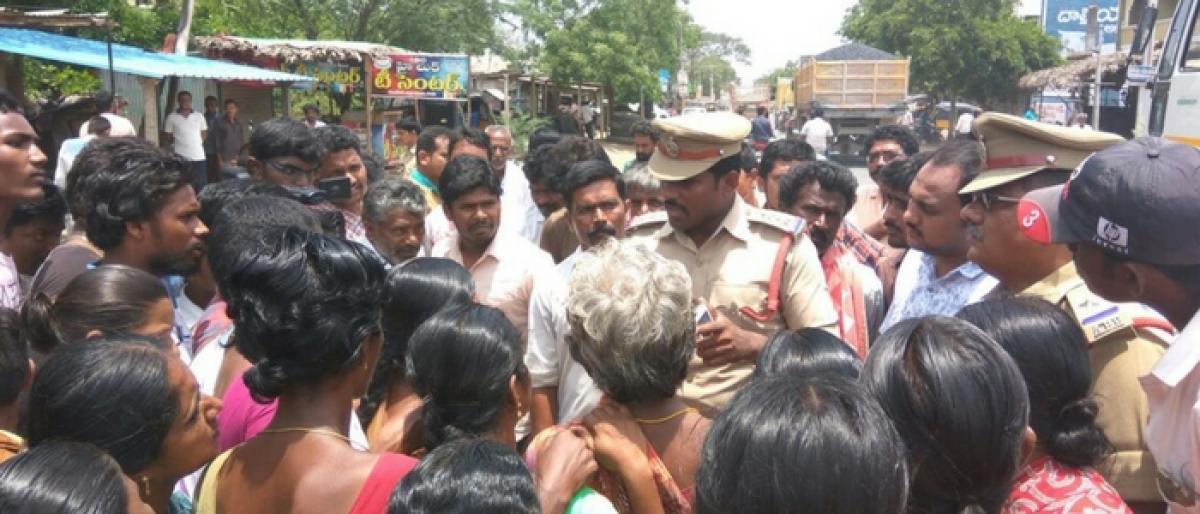Women up in arms against liquor policy

Women are up in arms over liquor sales in the State two decades after the anti-arrack movement which shook the then Congress government with Nellore district as the epicenter in the early 90s. The TDP government’s “New Liquor Policy” which came into force from July 1 has become a trigger for unrest in women folks, culminating into a widespread movement across the state with urban middle class in t
Vijayawada: Women are up in arms over liquor sales in the State two decades after the anti-arrack movement which shook the then Congress government with Nellore district as the epicenter in the early 90s. The TDP government’s “New Liquor Policy” which came into force from July 1 has become a trigger for unrest in women folks, culminating into a widespread movement across the state with urban middle class in the forefront.
The movement against liquor gathers pace mainly in areas inhabited by urban middle class as a striking contrast from the anti-arrack movement which took its roots in slums and at the literacy centres in rural areas.
Women are drawing support from their male counterparts in taking forward their agitation to keep the bars and liquor shops away from their colonies unlike in the anti-arrack movement.
The residents in urban and semi-urban areas hit the streets, offering strong resistance to the attempts by the liquor lobbies to establish bars and liquor outlets in residential areas much before the new liquor policy was rolled out.
The liquor traders are forced to search for alternative locations after the Supreme Court’s direction to the government to ensure that bars and wine shops located within 500mtrs from the highways shall be removed as a measure to avoid accidents on highways.
The government scrapped the clause in the AP Excise and Prohibition Act envisaging against location of bars and wine shops 500mtres away from residential areas, giving some leeway for the traders to shift their outlets from the highways into the nearby localities.
The government’s decision to allow 75 bars, in addition to the existing ones led to a mad rush by traders for ideal locations. The protesters are receiving a backing from women frontal organizations belonging to the Left parties. The opposition, is out to cash in on the public unrest by letting its vocal woman leader and actor RK Roja make noises.
The TDP committed itself in its manifesto to remove belt shops (unauthorized liquor outlets) in 2014 general elections. A senior TDP leader and former minister admitted that the government failed to make much headway in implementing its promise in the last three years of its ruling for the twin reasons—excise being a main source of revenue for the government and the powerful nexus between politics and liquor lobbies. The revenue from the excise accounts for 11 per cent of the total receipts of the AP government as per the projections in the budget for 2017-18.
All India Democratic Women’s Association (AIDWA) state unit general secretary D. Rama Devi said the government’s permission for bars and liquor shops in residential areas will raise serious issues relating to women’s safety while posing a threat to peaceful co-existence.
Extending support to the agitation, CPI (M) state secretary P. Madhu urged the government to take steps to `regulate’ the liquor trade as liquor consumption is closely associated with incidence of crime, a spurt in the number of single women and gender crimes.
His party’s stand for regulatory measures comes in contrast from its earlier demand for total prohibition at the time of anti-arrack movement. “Total prohibition is not possible anywhere in the world. What we can do is only regulation”, he told The Hans India.
Dr V Bramha Reddy, a medical practitioner from Kurnool who was actively involved in the anti-arrack movement on behalf of the undivided Jana Vignana Vedika (JVV) said the health expenditure incurred by alcoholics is four times more the revenues accrued by the government by way of selling liquor, contradicting the revenue constraints put forth by the government.
He expressed serious concern over students and youth becoming more vulnerable to liquor consumption in the post anti-arrack movement. Dr Reddy, who runs a rural hospital at Dupadu in the district, said there is a spurt in cases of infertility and sexual impotency in people addicted to alcohol at a young age, besides liver cirrhosis, of late.

